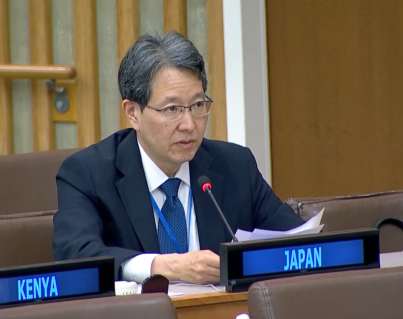UNICEF執行理事会 2022年次会合における木村大使ステートメント
令和4年6月14日

Japan appreciates UNICEF and its staff for their tireless efforts to save lives and protect the rights of children, particularly in this difficult time of global challenges caused by COVID-19 and the dire situation in Ukraine.
In 2021, the Government of Japan provided approximately $328 million USD for UNICEF's activities, and has provided $144 million USD to date in 2022.
We are now especially challenged to support children in situations of emergency and crisis, including in conflict zones such as Ukraine. In response to UNICEF's request for emergency assistance, the Government of Japan has decided to contribute $24.2 million USD in emergency humanitarian assistance to Ukraine and neighboring countries. We are providing assistance through UNICEF in the areas of child protection, health and nutrition, water and sanitation, and education for a total of approximately 1.4 million people.
In addition, we are aware of concerns about the increasing trend of wasting disease in the world from rising food insecurity due to the combination of the intensifying situation in Ukraine and drought caused by climate change. The Government of Japan has been providing nutrition assistance in Yemen, Afghanistan, and several African countries, and will continue to do so.
Focusing on the most vulnerable children in a fragile situation and protecting and empowering them is important from a human security perspective.
In this connection, Executive Director Russell, could you share with us your thoughts on how UNICEF will support communities, beyond humanitarian assistance, from the perspective of the Humanitarian-Development-Peace Nexus, in order to strengthen their sustainability and resilience, as well as to provide appropriate educational opportunities for children?
Mr. President,
Speaking of education, I would like to highlight the importance of promoting cooperation in education, with view to the Transforming Education Summit (TES) to be held in September of this year. Japan, as a member of the TES advisory committee, a co-lead of Thematic Action Track 2, and one of the co-chairs of the Group of Friends on Education and Lifelong Learning, would like to reiterate our support for the Summit.
Even as we are witnessing a rollback of hard-won achievements in education and other Sustainable Development Goals, we believe that Education for Sustainable Development (ESD) is a key enabler to promoting all the SDGs. ESD is an important cross-cutting instrument to not only address challenges in education, but also to solve various issues, such as poverty, health, water and sanitation, climate change, and natural disasters, among others.
ESD also plays an important role in promoting and enhancing public awareness of the SDGs and fostering cultures of peace and non-violence. ESD can contribute to changing society by imbuing people with skills and values that will stay with them beyond their education. UNICEF has a significant role to play in the efforts to achieve SDG 4. I would like to ask Executive Director Russell how UNICEF will make best use of ESD as a cross-cutting instrument.
Finally, Japan is deeply committed to its close cooperative relationship with UNICEF and stands ready to actively support its activities.
I thank you.
